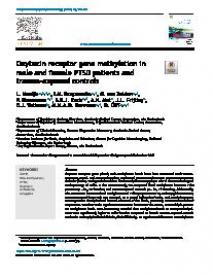Oxytocin receptor gene methylation in male and female PTSD patients and trauma-exposed controls
Oxytocin receptor gene (OXTR) DNA-methylation levels have been associated with traumaexposure, mood- and anxiety disorders, and social processes relevant to posttraumatic stress disorder (PTSD). We hypothesized that OXTR methylation may play a role in the neurobiological underpinnings of PTSD. In the current study, we compared OXTR methylation between PTSD patients (n = 31, 14 females) and trauma-exposed controls (n = 36, 19 females). Additionally, the association between OXTR methylation and PTSD symptom severity and amygdala reactivity to an emotional faces task was assessed, as a neural hallmark of PTSD. DNA-methylation was investigated in the CpG island located at exon 3 of the OXTR, previously associated with OXTR expression. We observed a significant interaction between PTSD-status, sex and CpG-position on methylation levels. Post-hoc testing revealed that methylation levels at two specific CpGsites were significantly higher in PTSD females compared to female trauma-exposed controls and PTSD males (CpGs Chr3:8809437, Chr3:8809413). No significant differences in methylation were observed between male PTSD patients and controls. Furthermore, within PTSD females, methylation in these CpG-sites was positively associated with anhedonia symptoms and with left amygdala responses to negative emotional faces, although this was no longer significant after stringent correction for multiple-comparisons. Though the modest size of the current sample is an important limitation, we are the first to report on OXTR methylation in PTSD, replicating previously observed (sex-specific) associations of OXTR methylation with other psychiatric disorders.
Geachte bezoeker,
De informatie die u nu opvraagt, kan door psychotraumanet niet aan u worden getoond. Dit kan verschillende redenen hebben,
waarvan (bescherming van het) auteursrecht de meeste voorkomende is. Wanneer het mogelijk is om u door te verwijzen naar de bron
van deze informatie, dan ziet u hier onder een link naar die plek.
Als er geen link staat, kunt u contact opnemen met de bibliotheek,
die u verder op weg kan helpen.
Met vriendelijke groet,
Het psychotraumanet-team.
In: European Neuropsychopharmacology ; ISSN: 0924-977X | 29 | 1 | 147-155
https://www.sciencedirect.com/science/article/pii/S0924977X18308411


